

Room for Discussion. An old idea is back on the agenda: an unconditional guaranteed basic income for all, no questions asked.
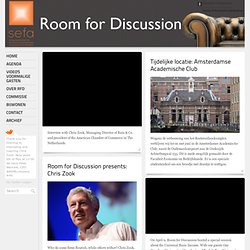
No more worries, but economic freedom for all, the end of poverty. A free lunch fallacy, or socio-economic paradise? Recently Rutger Bregman reinvigorated the idea of the universal basic income on Dutch television in Tegenlicht, which seems more than a trend. The international discussion on basic income has been rekindled. With technology increasing productivity to unknown heights, a new question has popped up. On Wednesday the 9th of April, Room for Discussion will foster an economic debate on basic income with Guy Standing.
@Room4Discussion sur Twitter. The world has changed, the syllabus hasn't – is it time to do something about it? @PostCrashEcon sur Twitter. Economics students aim to tear up free-market syllabus. Few mainstream economists predicted the global financial crash of 2008 and academics have been accused of acting as cheerleaders for the often labyrinthine financial models behind the crisis.
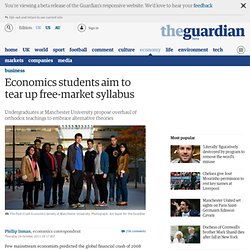
Now a growing band of university students are plotting a quiet revolution against orthodox free-market teaching, arguing that alternative ways of thinking have been pushed to the margins. Economics undergraduates at the University of Manchester have formed the Post-Crash Economics Society, which they hope will be copied by universities across the country. The organisers criticise university courses for doing little to explain why economists failed to warn about the global financial crisis and for having too heavy a focus on training students for City jobs.
A growing number of top economists, such as Ha-Joon Chang, who teaches economics at Cambridge University, are backing the students. Earle said students across Britain were being taught neoclassical economics "as if it was the only theory". Academics back students in protests against economics teaching. A prominent group of academic economists have backed student protests against neo-classical economics teaching, increasing the pressure on top universities to reform courses that critics argue are dominated by free market theories that ignore the impact of financial crises.
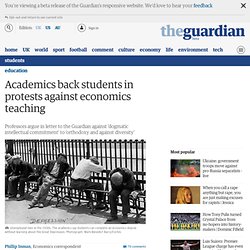
The academics from some of the UK's most prestigious institutions, including Cambridge and Leeds universities, said students were being short-changed by their courses, and they accused higher education funding bodies of being a barrier to reforms. Letters: Post-Keynesians are staging a comeback. Colleges are teaching economics backwards. “The world has changed, the syllabus hasn't.”
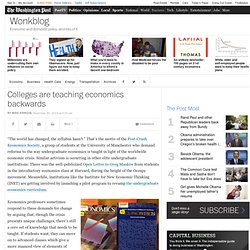
That’s the motto of the Post-Crash Economics Society, a group of students at the University of Manchester who demand reforms to the way undergraduate economics is taught in light of the worldwide economic crisis. Similar activism is occurring in other elite undergraduate institutions: There was the well-publicized Open Letter to Greg Mankiw from students in the introductory economics class at Harvard, during the height of the Occupy movement. Meanwhile, institutions like the Institute for New Economic Thinking (INET) are getting involved by launching a pilot program to revamp the undergraduate economics curriculum. Economics professors sometimes respond to these demands for change by arguing that, though the crisis presents unique challenges, there’s still a core set of knowledge that needs to be taught.
If students want, they can move on to advanced classes which give a more nuanced view of elements of economics. It used to be different. Rethinking Economics London, June 28th-30th 2013. Rethinking Economics (rethinkecon) sur Twitter. Het academisch economie-onderwijs schiet tekort. Het economie-onderwijs aan de Nederlandse universiteiten is op zijn best saai en eenzijdig, en op zijn slechtst misleidend en irrelevant.
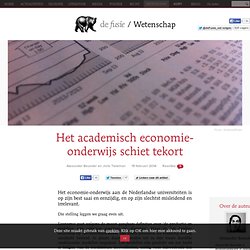
Die stelling leggen we graag even uit. Economie gaat volgens de meest gangbare definities over ‘de productie en verdeling van schaarse goederen en diensten’. Maar in het huidige onderwijs op universiteiten wordt aan zowel productie als verdeling weinig aandacht besteed. In plaats daarvan worden tot in den treure dezelfde neoklassieke modellen toegepast. Die modellen zijn geschikt om een beeld te krijgen van de beschikbare hoeveelheden, nuttig voor bijvoorbeeld het maken van CPB-prognoses. Het economie-onderwijs is saai, eenzijdig, misleidend en irrelevant. Rebellious Economics Students Have a Point. In case you missed it—and you probably did—there’s a revolt afoot in the universities.
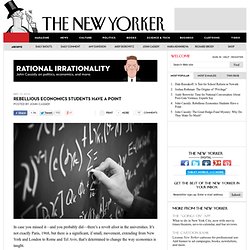
It’s not exactly Paris, 1968, but there is a significant, if small, movement, extending from New York and London to Rome and Tel Aviv, that’s determined to change the way economics is taught. Echoing complaints that have been mounting in the economics world for at least twenty years, and which became louder after the financial crisis of 2008, the student rebellion is calling for a more pluralistic and diverse approach, rejecting the textbook methodology that all too often reduces economics to a set of mathematical exercises. “The real world should be brought back into the classroom, as well as debate and a pluralism of theories and methods,” a group called the International Student Initiative for Pluralism in Economics said, in an open letter that was posted online last week. “This will help renew the discipline and ultimately create a space in which solutions to society’s problems can be generated. Economiestudenten rebelleren: de werkelijkheid blijft de theorie overtreffen - Onderwijs.
Door: Dominique Soenens − 28/05/14, 16u00 © thinkstock.
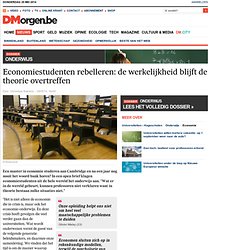
Een master in economie studeren aan Cambridge en na een jaar nog nooit het woord bank horen? In een open brief klagen economiestudenten uit de hele wereld het onderwijs aan. "Wat er in de wereld gebeurt, kunnen professoren niet verklaren want in theorie bestaan zulke situaties niet. " Onze opleiding helpt ons niet om heel veel maatschappelijke problemen te duidenOlivier Malay (23)Economen sluiten zich op in rekenkundige modellen, terwijl de psychologie van bankiers misschien veel belangrijker isLode Vereeck, hoogleraar economie.